Melbourne wakes as a divided city, hotspot residents stopped at checkpoints
Students living in Victoria’s virus hotspots could return to remote learning next term after it was revealed there have been student-to-student transmissions. It comes as another 77 coronavirus cases were recorded and lockdown restrictions turn “hot zones” into ghost towns.
Coronavirus
Don't miss out on the headlines from Coronavirus. Followed categories will be added to My News.
This coronavirus article is unlocked and free to read in the interest of community health and safety. Get full digital access to trusted news from the Herald Sun and Leader for just $1 a week for the first 12 weeks
Families may be forced back into home learning for Term Three after the first signs of student-to-student coronavirus infections have been detected within Victorian schools.
As clusters at two coronavirus hot spot schools grew again yesterday it was revealed there have also been multiple cases of teacher-to-teacher transmission of COVID-19, raising doubts whether school will return in all areas after the current holidays.
Victoria’s Chief Health Officer Brett Sutton on Thursday confirmed the first cases of students spreading coronavirus to classmates had emerged, though the full extent of the transmissions were being investigated.
“There has been some student to student transmission and also teacher to teacher transmission at some schools,” Prof Sutton said.
“Some of them might be from the same household or might be linked outside the school setting
“We are certainly seeing some evidence of student to student and teacher to teacher- especially teacher to teacher - transmission.”
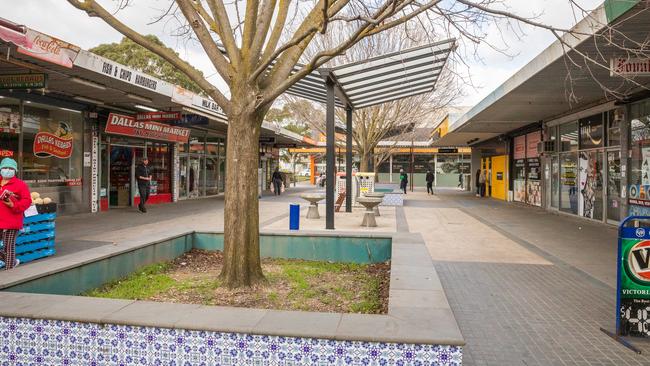
Another five coronavirus cases were today linked to Albanvale Primary School in Melbourne’s west - including three students, a teacher and another close contact - a further two cases have been linked to a cluster at Al-Taqwa College in Truganina.
With 17 Victorian schools having been closed in recent weeks for deep cleaning following COVID-19 cases, Prof Sutton warned the chances of a return to learning from home arrangements was being examined.
“It will certainly be reviewed on a day-to-day basis,” Prof Sutton said.
“I will give as much notice as I possibly can around the resumption of school specific to the restricted postcodes.
“I think the expectation is schools will return, but I do want to see both that we are turning transmission around but also that we don’t have such levels of community transmission with students becoming infected that our resourcing is all focused on response to cases in schools.”
While the evidence of Victoria’s first surge of COVID-19 cases mirrored global evidence of children being much less likely to contract or transmit coronavirus, Prof Sutton said the vastly increased level of community transmission now buffeting the state was painting a new picture.
He conceded he levels of testing in the pandemics early stages was also geared away from children, though the recent experiences and introduction of saliva testing were uncovering greater transmission.
“We are now obviously engaging with a lot of families getting testing of kids at a household level and so (we are) probably picking up cases that would have gone unnoticed previously,” he said.
“Kids are not as likely to transmit, that is pretty clear now. So they are less of a priority for testing.
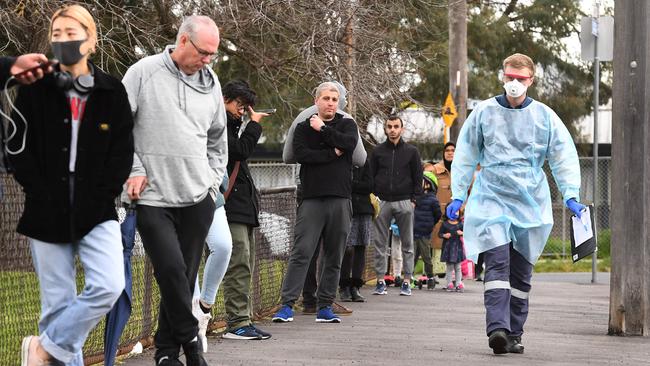
It comes as more than 400 of Camberwell Grammar School’s 1300 students have been tested in the past 24 hours after two teachers and a Year 7 student tested positive to coronavirus.
The Canterbury school arranged for a testing pop up at a GP clinic on Wellington Road, Box Hill, on Thursday and Friday. The boys’ school is having two week break, in line with govenrment schools, but has a three week break after third term.
On Wednesday the school notified families that teachers and students needed to be tested after two teachers, including a Year 9 teacher, tested positive in the past week. Earlier, the Year 7 student tested positive.
“Broad testing in this manner is the best way to ensure that our school is as safe as possible when school resumes next term,” Camberwell Grammar deputy head/head of senior school Rob French said Thursday afternoon.
“Yesterday over 400 tests were conducted at the CGS-specific site in Box Hill alone. I was tested there this morning and the wait time was just 5 minutes and the test itself was non-invasive and mild.”
One parent told the Herald Sun he was angry that the government wasn’t forcing everyone at the school to be tested.
“It seems to be a voluntary thing that means hundreds of students may not be tested. The problem I have got it that no one appears to be forcing people to be tested.,” he said.
The pop up testing site is from asyptomatic students and teachers while anyone with a runny nose, cough, fever, chills, sore throat should attend the Respiratory Assessment Service at Box Hill Hospital.
The test involves a throat and nasal swab.
It comes as two teachers at Ilim College campuses in coronavirus hotspots Dallas and Glenroy have tested positive for the virus.
Both suburbs are among the 10 postcode hotspots that went into lock down last night.
The Islamic school said although closed since June 26 it was working with the Department of Health and Human Services to ensure best practice.
“Understandably, this is a challenging situation for the Ilim community, and we are working to manage the broad implications of the virus exposure,” the school said.
MARVEL STADIUM SECURITY GUARD TESTS POSITIVE
A security guard at Marvel Stadium has tested positive for coronavirus after working a spate of shifts including patrolling a service entryway.
The contractor was last on site on Monday, June 29.
However, the stadium received an intensive sanitisation clean ahead of tonight’s scheduled clash between Carlton and St Kilda.
No one who worked the same shift on Monday as the confirmed case is now rostered to work at the stadium this weekend.
‘SOME WILL DIE’: STARK REALITY OF VIRUS SPIKE
Victoria has recorded 77 new coronavirus cases overnight, including 31 cases of community transmission.
It comes as security contractors and the behaviour of their staff will be probed by an inquiry into Victoria’s hotel quarantine system.
Of the new cases, 13 have been linked to pre-existing outbreaks, with the source of 27 cases under investigation.
No new cases were recorded in returned overseas travellers, and 37 cases were discovered via routine testing.
The number of cases in hospital has risen to 20, including four in intensive care.
There are currently 415 active cases of coronavirus in Victoria.
The state’s chief health officer said not all of the cases were in the locked down suburbs.
“They are largely in the hot zones, as it were, but not exclusively,” Prof Brett Sutton said.
“One of the issues is people do move around a little bit.
“Obviously now, with the restrictions in force, people should be limiting their movement to the fullest extent possible, only leaving home for four reasons, but prior to this, people have moved around and seen people in other suburbs and so some of those cases – and they’re a minority – are outside those so-called hot zones.”
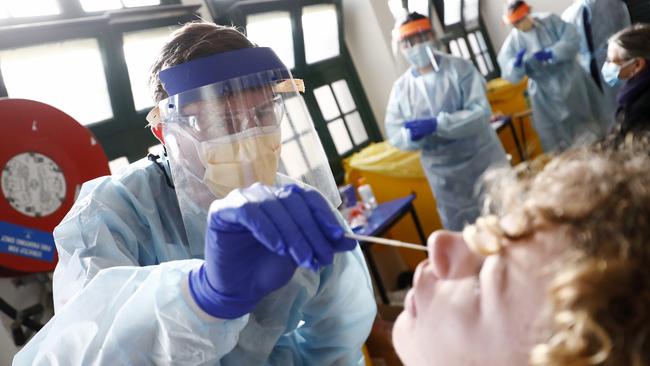
There is a total of 87 outbreaks that have been recorded in Victoria, but it is unclear how many of those outbreaks are active.
Of the new cases, five have been linked to Albanvale Primary School in three students, one teacher and a close contact.
Two cases have been linked to Al-Taqwa College, with one further case linked to the Stamford Plaza outbreak and one linked to Villa Bambini in Essendon.
One case has been linked to Springside Primary School, and one case linked to a Patterson Lakes family outbreak.
A total of 20 cases have been linked to an outbreak spanning eight households in a Roxburgh Park extended family. Not all 20 cases were reported today, but contact tracing has linked 20 cases to the one outbreak.
Prof Sutton dismissed theories the strain of coronavirus prevalent in Melbourne is more virulent than the strain present in other cities.
“In relation to the strain that might be predominating in Melbourne at the moment, I don’t think there’s any evidence that it’s more virulent,” he said.
“I think the evidence we have from overseas where there’s more transmission or faster transmission really related to how people are behaving and the cohort of the population that are infected.
“I don’t think it’s a feature of the virus at all.”
INFECTIOUS MAN LEFT MELBOURNE QUARANTINE EARLY
A man who tested positive to coronavirus in hotel quarantine in Melbourne was allowed to travel to Sydney 10 days later despite potentially still showing symptoms, before testing positive for the virus after working at Balmain Woolworths last week.
He tested positive three or four days into hotel quarantine, and then was able to leave the hotel when the full 14 days was up, 10 days after he tested positive.
He wasn’t asked to get tested again and didn’t have to return a negative test to leave quarantine.
The shock development has sent NSW authorities into a scramble, with the man now being treated as infectious.
The man worked at Balmain Woolworths on June 27 and 28.
It comes as a Northern Territory man returning from a Melbourne hot spot tested positive for coronavirus.
The Darwin man aged in his 30s is the NT’s first new confirmed case of COVID-19 since April 6.
NT authorities said the man had quarantined in a Melbourne hotel for 14 days after returning from overseas and then spent time with family in one of the city’s 10 hot-spot postcodes while awaiting a flight to Darwin.
The man flew into Darwin from Brisbane on Monday on QF836 and returned a positive test result on Wednesday night.
DARWIN MAN CONTRACTS VIRUS AFTER VISITING MELBOURNE HOTSPOT
A Darwin man who returned to the NT following two weeks in hotel quarantine in Melbourne has tested positive to coronavirus after spending a few days in a Melbourne hotspot.
The NT’s Health Minister Natasha Fyles said the man, in his 30s, had flown in on an international flight and spent 14 days in hotel quarantine in Melbourne.
The traveller, cleared of hotel quarantine, then spent a few days with family who lived in a declared coronavirus hotspot in Melbourne.
He then flew to Darwin, via Brisbane, on Qantas Flight 836 arriving on Monday.
“They started to feel unwell and were tested and those results came through last night,” Ms Fyles said.
Contact tracing is now being undertaken for all passengers who travelled on QF836 on Monday.
The new case breaks NT’s country-leading 42-day streak since the last active COVID-19 case – an Australian Defence Force member who tested positive while serving overseas – was cleared of the virus on May 21.
Read the full story here.
– Judith Aisthorpe and Madura McCormack
OPPOSITION LEADER CALLS FOR STATE HEALTH MINISTER TO BE SACKED
State opposition leader Michael O’Brien has called for health minister Jenny Mikakos to be sacked over the government’s mishandling of the coronavirus crisis.
Mr O’Brien said today it was time for heads to roll over the coronavirus crisis that has remerged this week and sent more than 300,000 Victorians back into lockdown.
“This has been a complete and utter debacle,” Mr O’Brien said.
“It’s time for the health minister who’s responsible for this mess to pay the price, and she should pay the price by being sacked,” he said.
Mr O’Brien said Ms Mikakos was ultimately responsible for overseeing the government’s trouble-plagued hotel quarantine system which has been blamed for the second outbreak because of systemic failures in training practices and procedures.
“The reason this second outbreak has occurred is because the government failed to secure these ret travellers properly,” he said.
“The reason why these return travellers were put into quarantine was because they were a health risk to themselves and to the Victorian community.
“There has to be accountability for this, and this means the health minister has to go.”
“It’s time for heads to roll. Not out of politics, but out of accountability.”
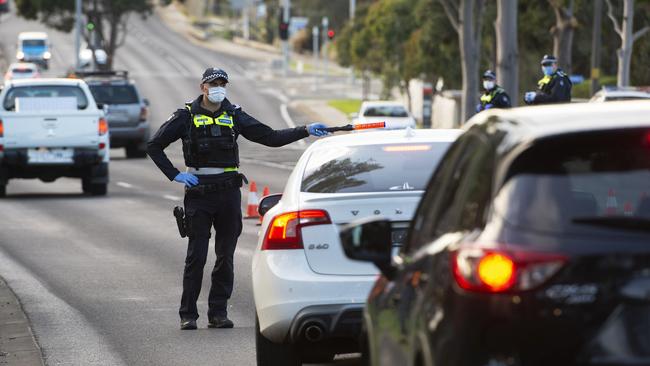
POLICE TO PATROL LOCKED DOWN AREAS
Victoria Police Chief Commissioner, Shane Patton, said there would be an increased police presence in the locked down areas.
“People will not know where we will be, they will not know how long we’ll be there for. But they’ll be intercepted,” Commissioner Patton said.
“I want to be absolutely crystal-clear: for those who are selfish enough to disregard these warnings from the CHO, the deliberate, obvious and blatant breaches, if they’re committing that, we will be infringing them.
“The window of police discretion is a very small window at the moment, I can assure you, and it’s rapidly closing.”
“Drivers and passengers can expect and should expect to see us and the strong probability that they’ll be intercepted and asked where they’re going and why they’re going there.
”You’d have to have been on Mars not to understand that the chief health officer restrictions apply in these 36 suburbs and that you’re expected to adhere to them.”
TRANSMISSION AT SCHOOLS
Prof Sutton confirmed that there was evidence to suggest virus transmission had occurred at schools.
“There has been some student-to-student transmission and also teacher-to-teacher transmission at some schools,” he said.
“Again, when there’s a heavy load of community transmission, more students getting infected, these schools have closed.
“The contact tracing that’s been done, obviously, for students and teachers who are now home, nonetheless the cleans are going on at the school and the investigations into the school settings are ongoing.”
Dr Sutton that the new focus on testing families in hotspots was causing more cases in children to be identified.
“We probably didn’t have such a level of community transmission that we were going to see so many cases in schools,” he said.
“I also think that we weren’t sufficiently pushing for testing of students or of kids and maybe because we hadn’t had a lot of cases in kids, there wasn’t a real push but we’re now obviously engaging with a lot of families, getting testing of kids at a household level, and so probably picking up cases that would otherwise have gone unnoticed previously.”
While there is no plan to revert to remote learning in locked down areas, Prof Sutton said it could become a possibility.
“It will certainly be reviewed on a day-to-day basis,” he said.
“I will give as much notice as I can around the resumption of school in those restricted postcodes.
“I want to see both that we’re turning transmission around but also that we don’t have such levels of community transmission with students becoming infected that our resourcing is all focused on response to cases in schools.
“Because we do need to focus our activity on all of the transmission across the community.
“Kids are not as likely to transmit. That’s pretty clear now.
“So they’re less of a priority for testing, but I think it is important that we enable testing in children as much as possible.”
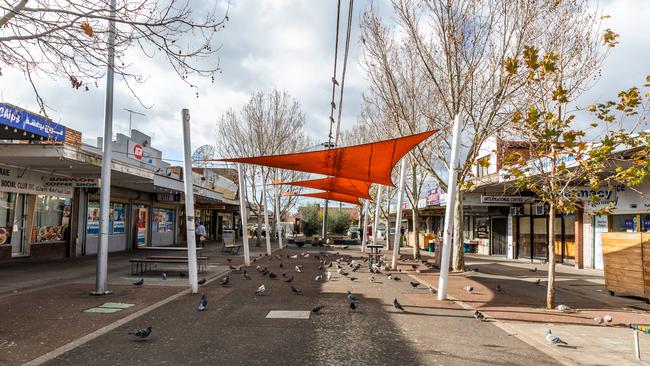
VIRUS HOTSPOT RESIDENTS CRASH VICROADS WEBSITE
VicRoads have clamped down on driver’s licence change-of-address requests in Melbourne’s 10 coronavirus hot spots after locals tried to alter their details to avoid going into lockdown again.
The authority will now review and request additional information from holders in the 10 locked-down postcodes after a surge of licence amendments were lodged as people tried desperately to avoid stage three restrictions for a second time. They came into force at midnight on Thursday.
Drivers are able to change their licence address instantly online and no proof is required, but the service was unavailable on Thursday morning.
Read the full story here.
- Jack Paynter
SUBURBAN LOCKDOWNS PREVENT BROADER RESTRICTIONS
Prof Sutton acknowledged the anger surrounding residents being forced back into lockdown.
“I understand that frustration. I’m not in a lockdown suburb but I’ve got colleagues and there are many staff in the department who are in those zones,” he said.
“We all have to cop it on the chin.
“The alternative is that there’s increased transmission and that there are more and more postcodes or all of metro Melbourne or all of Victoria that goes into a shutdown.
“When it’s been out of control in places internationally and continued to be out of control, it’s taken weeks and weeks and weeks to drive numbers down.
“Spain is now in a good position, having gone through a lockdown, but they had a period where there were six weeks where no-one could leave their home at all, including children.
“So we have to accept that we’re still in a better position than a number of places internationally and that this is a really frustrating, and hard sacrifice for people to make but it is the appropriate measure to get on top of this.
“I certainly feel for people, and it’s frustrating to see some areas where those restrictions aren’t in place, just across the road from where you might be.
“The point I would make is that the message is absolutely that we all need to reduce our travel outside of our homes, so the stay-at-home directions apply in law in some areas, there was always going to be a cut-off point where another suburb, another postcode was not under those same restrictions, but the message has to be same.
“Otherwise, we’ll all be in a worse situation together.”
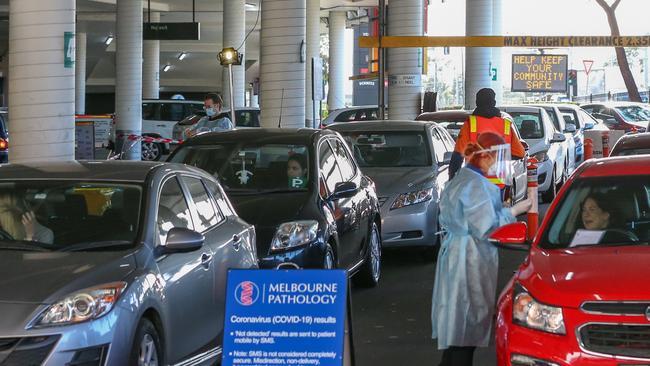
LOCKED DOWN RESIDENTS STOPPED AT CHECKPOINTS
Police are patrolling the entries to coronavirus hot spots across Melbourne, with the areas completely locked down this morning.
The lockdown blitz began with police setting up booze bus-style checkpoints in hotspot suburbs.
From today, residents of 36 suburbs across the city will have only four reasons to leave their home, including for essential shopping and exercise.
Those in areas including Broadmeadows and Keilor Downs will be subjected to the new lockdown laws.
Victoria Police has set up checkpoints at entrances to and from those areas to ensure people have a valid reason for being out of their home.
Officers arrived at Camp Road in Broadmeadows about 7.30am and were seen checking the license details and movements of drivers.
Drivers were waved into a designated section of the road, with about five officers wearing masks speaking to those passing through.
A drug and booze bus was also on scene.
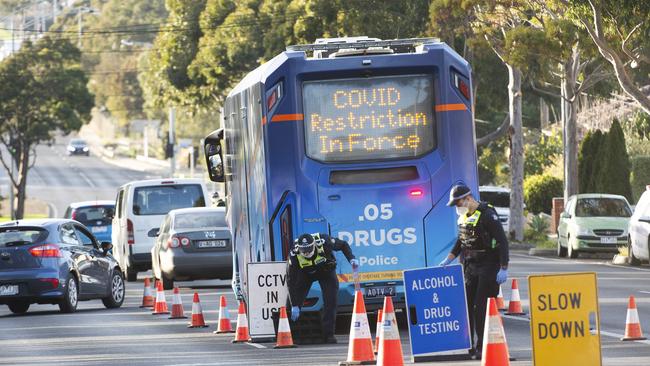
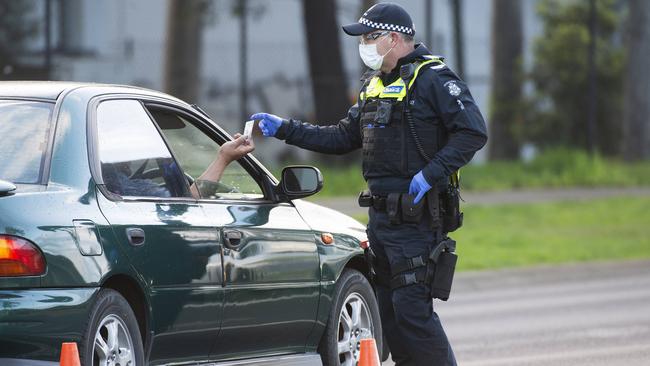
WHAT THE NUMBERS MEAN
Prof Sutton said cases identified by routine testing were usually later linked to a known outbreak or source of transmission.
“Very often, those numbers we’re reporting every day as routine testing are people who we then interview, then identify a link,” he said.
“They’ve got a relationship with one of our existing outbreaks, or that we can explore the links they have to other known cases.”
Prof Sutton said that identification of cases meant they could be isolated and prevented from passing the virus on.
“I get some comfort from stabilisation in numbers, but it is never an easy place to sit when you’ve got 415 active cases, all of which are infectious,” he said.
“Obviously, we’ve identified them. They’re in isolation.
“Their close contacts are in quarantine, but it’s an indication of a very large number of people who have acquired it, which means there are other infections still to be found out there and they’re all at risk of transmitting to others if we’re not doing the right thing.
“So the restrictions are in place, even though they apply to those restricted postcodes.
“We need to bear in mind that it’s something for all of us to do, especially across Melbourne, but really the whole of Victoria.”
THE BENEFITS OF SELF-ADMINISTERING SWAB TESTS
Prof Sutton said that while testing facilities were identifying the virus, there was a distinct benefit to rolling out self-administered swab tests.
“I think Victoria has more experience now in people doing testing than any other jurisdiction,” he said.
“It’s a relatively simple test to do. I think the people doing it are doing a high volume of testing.
“Not every virus will be picked up in every individual. Sometimes the level of virus will be low and even though someone’s infected, it won’t be at a level that gets detected.
“When people have symptoms, they’re more likely to identify the virus.
“But I’m confident that the people doing the tests will pick up the great majority if people are infected with it.
“There have been studies that look into people self-administering the swab tests.
“The advantage is it is more comfortable and people can titrate how they do the test so it’s not extremely uncomfortable for them.
“It may not be quite as sensitive as when it’s done by another operator but, again, when we’re talking about potentially having people tested who would otherwise not be tested, I think it’s a really valuable addition to roll out.”
ALL VICTORIANS SHOULD REMAIN VIGILANT: CHIEF HEALTH OFFICER
The state’s chief health officer has urged Victorians to make smart decisions irrespective of whether or not they live in a virus hotspot.
“Though the stay at home directions apply to those restricted postcodes, all of us across Victoria have to really consider whether we need to see people in other settings, other households, including family members and friends,” Prof Brett Sutton said.
“That will be the best mitigation against new postcodes being included, but those criteria that have been used for the restricted postcodes to date are the same criteria that we would apply to other postcodes.
“So it’s really up to all of the residents there, all of us across Victoria, to ensure that we can keep those numbers down, so that no new postcodes need to be considered for restrictions.”
Prof Sutton said that a rise in coronavirus numbers increased the likelihood more deaths would result from the virus.
“I’m afraid that (Victorians dying is) absolutely a possibility when you’ve got significant transmission, when you’ve got 70-odd cases every day, there is absolutely an expectation that some of those people will die,” he said.
“That’s why it’s incumbent on all of us to be minimising our interactions with others.”
PRIME MINISTER BACKS PREMIER’S COVID PLAN
Prime Minister Scott Morrison has expressed concern over the spike in Victorian cases but said he backed Premier Daniel Andrews’ handling of the escalating situation.
He offered further Commonwealth assistance to the state.
“I’m obviously concerned about the outbreak and I’m pleased that the Premier has taken the action he’s taken by both putting in place the lockdown for the outbreak in those suburbs in western Melbourne,” he said on Thursday.
“That was the appropriate response and they have our full support in implementing it and whatever additional resources they seek, whether that’s from the defence force or the Commonwealth public service.”
He said the plateauing of case numbers in Melbourne over the past few days was good news.
“We would hope to see those numbers fall again,” Mr Morrison said.
“But we take nothing for granted.
– Tamsin Rose
APPLE STORE TO STAY OPEN AFTER WORKER TESTS POSITIVE
An Apple worker at Westfield Fountain Gate has tested positive for coronavirus.
It’s understood the company confirmed the case on Tuesday after workers raised concerns about the staff member who was believed to be infectious while working in the store.
It’s believed the store will remain open.
An Apple spokeswoman said in a statement because the staff member was deemed not to have had any close contact with anyone else at the store, and there were stringent cleaning protocols in place, the Narre Warren store did not need to close to the public.
Read the full story here.
– Suzan Delibasic
LOCKDOWN ADDS INSULT TO INJURY FOR CRAIGIEBURN BUSINESSES
Almost 11,000 businesses across the 10 Melbourne postcodes in lockdown for a month were already relying on the Federal Government’s wage subsidy scheme to survive the coronavirus crisis.
The Herald Sun can reveal 2876 businesses in Craigieburn and surrounding suburbs are receiving fortnightly $1500 JobKeeper subsidies for their staff — the fifth highest number out of all Victorian postcodes.
The return of stay-at-home rules means businesses including gyms, beauty parlours and swimming pools now have to close again from Thursday, while cafes and restaurants can only open for takeaway and delivery.
Support payments of $5000 will be delivered by the State Government but local leaders say a bigger recovery package is urgently needed.
Q&A: WHAT RESTRICTIONS MEAN FOR HOTSPOT RESIDENTS
More than 1000 businesses in postcodes 3012, 3032, 3021 and 3046 are also using the JobKeeper scheme because their normal turnover crashed at least 30 per cent because of health restrictions enforced to tackle the virus.
The Herald Sun can also reveal more than 25,000 people in the 36 affected suburbs are currently out of work and receiving the JobSeeker unemployment benefit, with another 2000 on Youth Allowance.
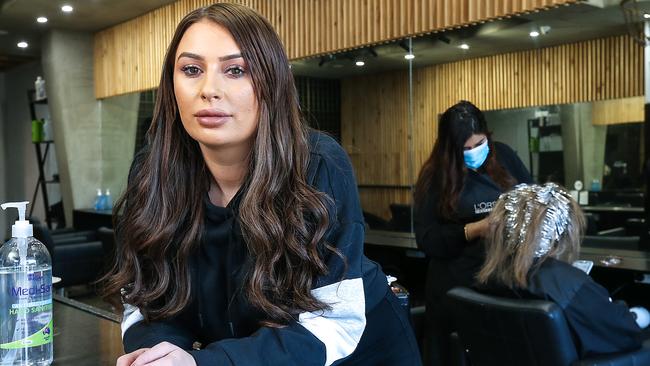
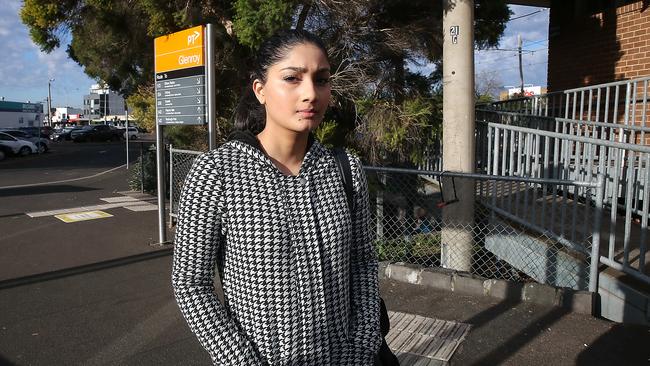
Hume Mayor Carly Moore said the local lockdown would have “an enormous impact” on businesses, and that many would not survive. She called for extra support because $5000 was not “a whole lot of money”.
“Another four weeks is a really long time for people who were already impacted,” Ms Moore said. “There were a lot of businesses who were really struggling to make ends meet before this happened.
“Now this has happened again, I don’t know how they are going to survive.”
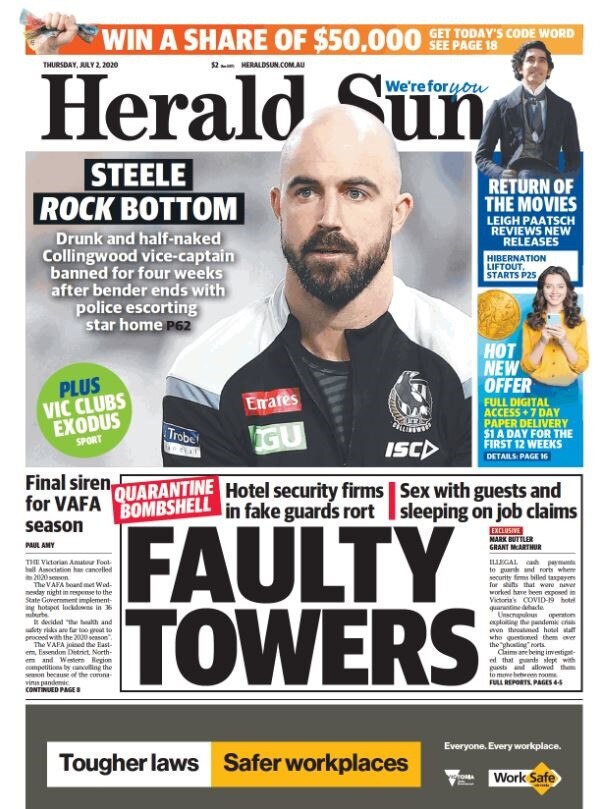
She said domestic and international flight restrictions had been a major blow to employment in the Hume region, with many workers tied to Melbourne Airport.
Coffee spot The Spade, in Glenroy, opened a little over a year ago but was forced to let staff go at the start of the pandemic. It hired new staff once restrictions began to ease and has been left in limbo by the second lockdown.
Owner Josh Mcasey, 26, said the business would continue to operate for takeaway food and coffee but that he would have to “rethink our game plan” without foot traffic.
“It’s pretty frustrating because obviously we want to progress as a company — but without bums on seats, we can’t,” he said.
Long-time hairdresser and owner of Mystique Creations, Cynthia Faraj, said she was confused by the new rules and whether her business could keep operating.
She said it was “upsetting” that people in virus hot spots had flouted health restrictions.
“It’s not fair to everybody else and it’s a bit sad,” Ms Faraj said.
Abdul Tayar, who owns real estate agency YPA Glenroy, said it would be “business as usual” for him after the industry adjusted to online auctions and inspections.
“I’ve given my staff the option to work from home, but at the end of the day there’s still people wanting to buy houses in this market,” he said.
Rose Mehmet, owner of Fawkner’s Bonwick Street Bakery, said it was “very sad” to be hit with restrictions again.
“Trade had been improving but everyone forgot we still had the virus and started living their life as normal,” she said.
“I want (our community) to take this seriously, more seriously than they did before.”
SUNBURY COLLEGE CLOSES DUE TO POSITIVE CASE
Sunbury College is the latest school to fall victim to a positive COVID-19 test.
A student at the school, which is located in hotspot Hume, returned the positive test meaning the school will completely shut from Thursday for the mandatory deep clean.
Principal at the college Darryn Hume urged the school’s community to remain calm in the tumultuous time.
“I am very aware that this is a time of heightened anxiety for us all,” he said.
“We wish the student a speedy recovery and look forward to welcoming them back to school next term once they have recovered.”
– James Mottershead
SEX WITH GUESTS AND SLEEPING ON JOB CLAIMS
Illegal cash payments to guards and billing rorts have been exposed in Victoria’s COVID-19 hotel quarantine debacle.
Unscrupulous security firms, being probed over their part in triggering Melbourne’s second coronavirus wave, exploited the pandemic by charging taxpayers for shifts never worked.
The rort — known as “ghosting” — led to hazardous understaffing in hotels, with those who questioned operators even being threatened.
HOLIDAY HELL FOR FAMILIES IN LOCKDOWN
The borders are drawn and the checkpoints are in place as people from Melbourne’s lockdown suburbs prepare to put their lives on hold for the next month.
Stay-at-home orders imposed on 10 postcodes have thrown up new challenges for residents and businesses caught on the wrong side of the divide.
The restrictions will be closely monitored by police using booze-bus style blockades to quiz people on where they’re from and where they’re going to.
People in the 36 suburbs designated as hot spots have been told to effectively quarantine themselves from the rest of the city until July 29, at least.
It’s led to people scrapping holiday plans and stocking up on supplies.
Others rushed to get on the road before restrictions came into place.
Stuart and Belinda McGregor of Niddrie, in Melbourne’s northwest, brought forward their family holiday to Halls Gap, arriving on Wednesday night, hours before the restrictions came into effect.
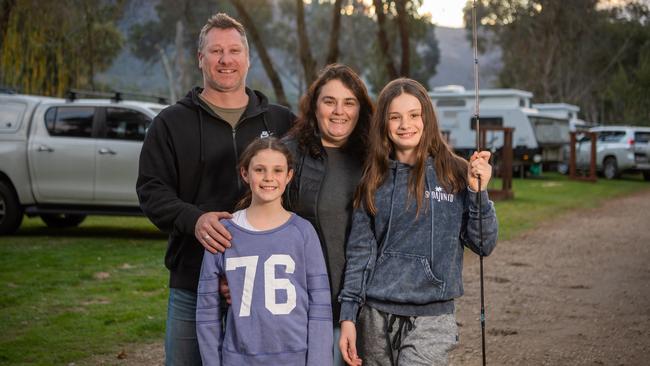
They and daughters Addison and Olivia plan to make the most of the getaway before returning to lockdown.
Mr McGregor said he was shocked Niddrie was included on the hotspot list and said the announcement prompted a last-minute change to their holiday plans.
“We checked with the caravan park and they were comfortable with us coming up a day earlier,” he said.
“We rejigged a few things and made our way as soon as we could. It was a mad scramble. But you know what, at least we’re away.”
Halls Gap Lakeside Tourist Park owner Josephina McDonald said her business had a flurry of calls from people having to cancel, and others saying they wanted to claim a booking if spots opened up.
“I think people recognise the bigger picture in all this, which is about preventing the whole country going into lockdown and to hopefully stop more people dying,” she said.
A $5 million emergency fund will be used to compensate tourism operators for lost income due to cancellations as a result of lockdowns.
Industry Support and Recovery Minister Martin Pakula said funds would be made available to motels, caravan parks and owners of short-term rental properties who could demonstrate losses.
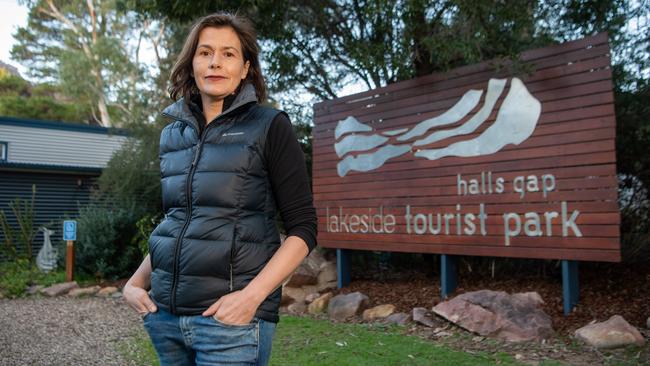
Payments of up to $225 per cancelled nightly booking will be paid, as long as operators have provided full refunds.
It comes as NSW warns residents in Victoria’s hot spots that they are “not welcome”, and border breaches may result in travellers getting a hefty fine and even being jailed.
“Victorians right now from those hot spots are not welcome in NSW,” said that state’s Health Minister, Brad Hazzard.
“If you come to NSW, you will be exposed to the possibility of six months’ jail and an $11,000 fine.”
Dallas mum Sidra Jutt, 29, said the new measures meant she had to cancel her son Mekaeel’s first birthday party which was planned for Thursday, as well as a family holiday to Lorne.
“I was really upset we had to cancel everything,” she said. “Being at home with the kids every day, it can be stressful.”
Barber Mehmet Akar said he was expecting a sharp decline in customers coming into his Dallas business.
“But what can you do? I just keep coming to work,” he said.
He said he was sceptical about the targeted lockdown and the way the restrictions had been mapped out.
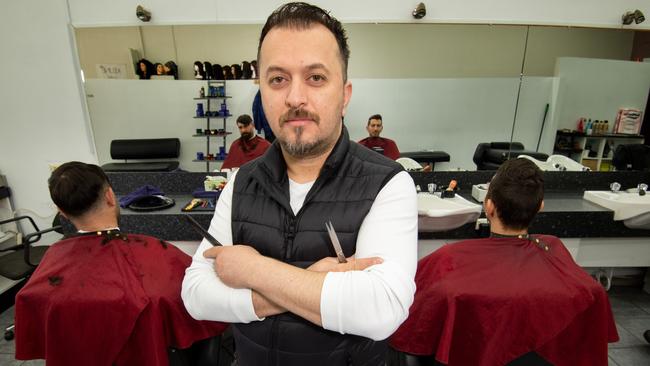
“It doesn’t make sense to shut down one place and not the others nearby. When Toorak had the virus, they didn’t shut it down, but now they are blaming other suburbs.”
A ban on holidays for anyone from hot spot suburbs meant many bookings were abandoned.
Under the rules, unless people were already at their destination by 11.59pm Wednesday, they were unable to travel.
Victorian Tourism Industry Council chief executive Felicia Mariani said that would affect most tourism operators.
MOST HOTELS ALREADY FIELDING CANCELLATIONS
A ban on holidays for anyone from hotspot suburbs means bookings have been abandoned.
Under the rules, unless people were already at their destination by 11.59pm Wednesday, they were unable to travel.
Victorian Tourism Industry Council chief executive Felicia Mariani said that affected the vast majority of tourism operators.
A survey of 40 accommodation providers in regional Victoria on Wednesday found 69 per cent had already recorded lost bookings and another 18 per cent were unsure about the impact yet.
Ms Mariani said that included a mix of guests cancelling and business owners cross-checking postcodes and proactively contacting people telling them they would have to reschedule their stay.
The latest setback had left the industry “shell-shocked”, she said.
“It’s been a long and difficult 2020 for everyone. The whole industry has been reeling since January going back to the bushfires. It’s just ‘how much more of this can we take?’”
She said operators were doing their best to stay pragmatic.
“At the end of the day everyone recognises we need to get control of this thing.”
SURGE IN NEW CASES
Victoria has recorded its biggest surge in community transmission since the start of the coronavirus pandemic, with 73 new infections discovered on Wednesday.
More than 300 cases have now been linked to community transmission across the state, an increase of 20 from Tuesday.
It comes amid rising concerns that children could return to remote learning after four additional schools were shut down for cleaning after students tested positive.
Most of Victoria’s new cases were linked to existing hotspot suburbs, with doorknocking to ramp up and new pop-up testing clinics set up in these areas.
Self-administered kits will be handed out in some cases and more than 113,000 tests have been processed as part of a blitz of high-risk regions.
Maidstone, Broadmeadows and Albanvale were targeted on Wednesday and testing crews will on Thursday hit the streets of Brunswick West.
Among the new cases recorded, two were linked to an outbreak at Samford Plaza taking the hotel cluster to 31.
Another five staff members from Al Taqwa College tested positive and an additional case was linked to an outbreak starting in North Melbourne.
The Melbourne offices of national broadcaster SBS was closed and sanitised after a staff member tested positive.
With additional reporting by Tom Minear, Alanah Frost and Jack Paynter
MORE NEWS
SUBURBS IN LOCKDOWN: YOUR QUESTIONS ANSWERED
VICTORIA’S REJECTED FLIGHTS WON’T GO TO NSW
